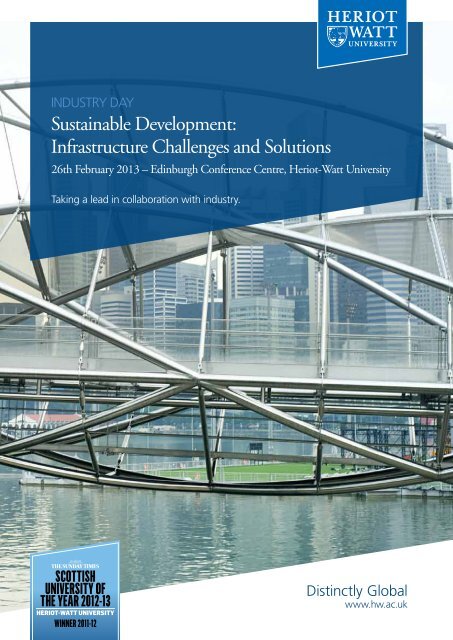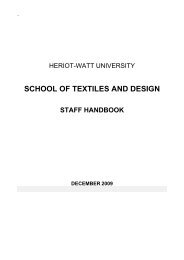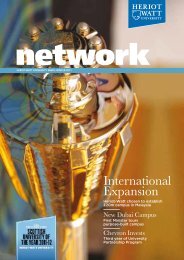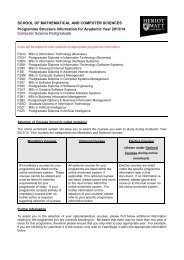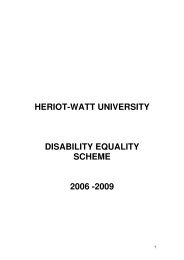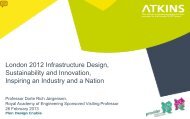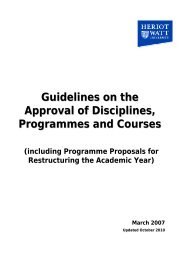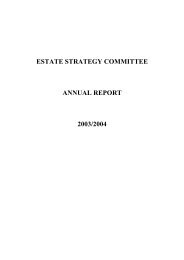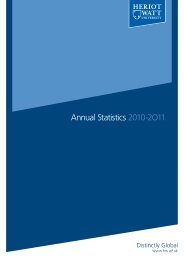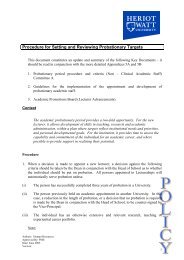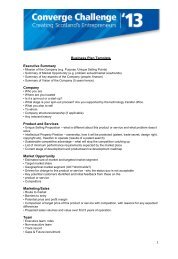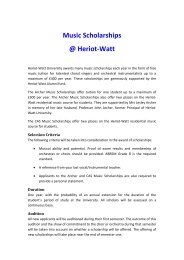Industry Day 2013 brochure - Heriot-Watt University
Industry Day 2013 brochure - Heriot-Watt University
Industry Day 2013 brochure - Heriot-Watt University
You also want an ePaper? Increase the reach of your titles
YUMPU automatically turns print PDFs into web optimized ePapers that Google loves.
<strong>Industry</strong> <strong>Day</strong><br />
Sustainable Development:<br />
Infrastructure Challenges and Solutions<br />
26th February <strong>2013</strong> – Edinburgh Conference Centre, <strong>Heriot</strong>-<strong>Watt</strong> <strong>University</strong><br />
Taking a lead in collaboration with industry.<br />
Distinctly Global<br />
www.hw.ac.uk<br />
www.hw.ac.uk 1
Contents<br />
Introduction 4<br />
Hosts & Keynote Speakers 5<br />
Programme 6<br />
Meeting the Hydro Nation Challenge 8<br />
Materials and Design Technology 10<br />
Energy Conservation and usage in homes of the future 12<br />
Networks and Infrastructure 14<br />
Posters 16<br />
Leading <strong>Industry</strong> Innovation 17<br />
Meet the Business Development Team 18<br />
Conference Venue Map 19<br />
3<br />
www.hw.ac.uk 3
Introduction<br />
Welcome to <strong>Heriot</strong>-<strong>Watt</strong> <strong>University</strong>’s<br />
third annual industry day which this year<br />
focuses on Infrastructure Challenges and<br />
Solutions for Sustainable Development.<br />
This year is bigger and better than ever<br />
and brings together thought leaders<br />
from both academia and industry at this<br />
key event. We hope delegates can build<br />
on existing connections as well as forge<br />
new links with leading experts in this<br />
interdisciplinary field.<br />
This year we are privileged to welcome Dr.<br />
Rajendra K Pachauri, the Chair of the Nobel<br />
Peace Prize-winning Intergovernmental<br />
Panel on Climate Change (IPCC) and<br />
director of TERI (The Energy and Resources<br />
Institute). Dr Pachauri is a prominent<br />
researcher on environmental subjects,<br />
recognised internationally for his efforts<br />
to build up and disseminate greater<br />
knowledge about man-made climate<br />
change and to lay the foundations for the<br />
measures that are needed to counteract<br />
such change. I am sure we are all looking<br />
forward to his keynote address on Meeting<br />
the Challenge of Climate Change and the<br />
Role of <strong>Industry</strong>.<br />
Also joining us will be distinguished<br />
speakers from the world of industry, with<br />
topics ranging from water management,<br />
solar power innovations and modern<br />
building design and construction, to the<br />
infrastructure and design of the London<br />
2012 Olympic Park. As well as industry<br />
professionals, we will have presentations<br />
by leading academics from <strong>Heriot</strong>-<strong>Watt</strong>,<br />
drawing on their vast experience and<br />
research to discuss the challenges and<br />
advancements across key themes such<br />
as railway technologies, information<br />
management, logistics and domestic energy.<br />
<strong>Heriot</strong>-<strong>Watt</strong> <strong>University</strong> has a breadth of<br />
expertise in Sustainable Development<br />
and is developing many varied solutions<br />
to the huge challenges mankind face in<br />
this area. Throughout the day, delegates<br />
can choose between our 4 parallel<br />
sessions. The morning sessions will cover<br />
a range of subjects from the management<br />
of water resources, to environmental<br />
and social impact of material use in<br />
construction. The afternoon sessions<br />
focus on some key areas including energy<br />
efficiency in buildings and the sustainable<br />
development challenges and solutions in<br />
networks and infrastructure.<br />
I would also encourage delegates to view<br />
the posters that will be on display around<br />
the centre, which demonstrate some of<br />
the research we currently undertake. If you<br />
wish to find out more about anything you<br />
hear or see today, please contact one of our<br />
Business Development Executives, whose<br />
details are to the rear of this booklet.<br />
Thank you for joining us today at <strong>Heriot</strong>-<br />
<strong>Watt</strong>, I hope you will have an enjoyable<br />
and enlightening day.<br />
Prof. Steve Chapman<br />
Principal & Vice-Chancellor,<br />
<strong>Heriot</strong>-<strong>Watt</strong> <strong>University</strong><br />
4 Sustainable Development: Infrastructure Challenges and Solutions
Hosts & Keynote<br />
Prof. Steve Chapman<br />
Principal & Vice-Chancellor, <strong>Heriot</strong>-<strong>Watt</strong> <strong>University</strong><br />
After receiving his PhD in 1983, Professor Chapman moved to the Massachusetts Insitute of<br />
Technology on a NATO fellowship. He returned to the UK to lecture at the <strong>University</strong> of Edinburgh,<br />
before progressing to the positions of Chair of Biological Inorganic Chemistry, Head of School for<br />
Chemistry and finally Vice-Principal for Planning, Resources & Research Policy in 2006. He became<br />
Principal & Vice-Chancellor of <strong>Heriot</strong>-<strong>Watt</strong> <strong>University</strong> in 2009.<br />
He has received widespread recognition for his research, receiving the Interdisciplinary Award of the<br />
Royal Society of Chemistry for ground-breaking work at the interface of Chemistry and Biology. He has<br />
published over 200 scientific papers in prestigious journals and has given numerous Plenary Lectures at<br />
international conferences. In 2005 he was elected as a Fellow of the Royal Society of Edinburgh and a<br />
Fellow of the Royal Society of Chemistry.<br />
Dr. R.K. Pachauri<br />
Chair of the Intergovernmental Panel on Climate Change (IPCC), Director General of TERI<br />
Dr Pachauri assumed his current responsibilities as the Chief Executive of TERI (The Energy and Resources<br />
Institute) in 1982, first as Director and, since April 2001, as Director-General. TERI performs original<br />
research and provides knowledge in the areas of energy, environment, forestry, biotechnology, and the<br />
conservation of natural resources to governments, institutions, and corporate organisations worldwide.<br />
In April 2002, Dr Pachauri was elected the Chairman of the Intergovernmental Panel on Climate Change,<br />
established by the World Meteorological Organization and the United Nations Environment Programme in<br />
1988. The IPCC along with former US Vice President Al Gore was awarded the “Nobel Peace Prize” in 2007.<br />
Dr Pachauri is a prominent researcher on environmental subjects, recognised internationally for his<br />
efforts to build up and disseminate greater knowledge about man-made climate change and to lay the<br />
foundations for the measures that are needed to counteract such change. He is currently serving as the<br />
head of Yale <strong>University</strong>’s Climate and Energy Institute (YCEI).<br />
Dr Pachauri’s wide-ranging expertise has resulted in his membership of various international and national<br />
committees and boards. At the international level, these include his positions as.<br />
• Member, Advisory Board for the Clinton Climate Initiative, USA, January 2010 onwards;<br />
• Member of a High Panel on Peace and Dialogue among Cultures, UNESCO, France,<br />
December 2009 onwards;<br />
• Adviser, International Advisory Board, Toyota Motor Corporation, Japan, April 2006 – March 31st, 2009;<br />
• Member, Board of the International Solar Energy Society (1991-97);<br />
• Member, World Resources Institute Council (1992);<br />
• President and Chairman, International Association for Energy Economics, Washington, D C (1988,<br />
1989-90, respectively);<br />
• President, Asian Energy Institute (1992 onwards).<br />
• He was a member of the board of the Global Humanitarian Forum (founded by the former United<br />
Nations Secretary General Kofi Annan) from 2007 to 2010.<br />
He is active in several international forums dealing with the subject of climate change and its policy<br />
dimensions. He has also authored 27 books and several papers and articles.<br />
Prof. Alan Miller<br />
Deputy Principal, Research and Knowledge Transfer<br />
He is a Fellow of the Royal Society of Edinburgh, the Institute of Physics, the Institution of Electrical and<br />
Electronic Engineers, and the Optical Society of America. His research covers nanostructure semiconductors,<br />
ultrashort pulse lasers and optoelectronic devices that bridges between fundamental physics, electrical<br />
engineering, and photonics applications.<br />
He is currently the Research Awards Convener for the Royal Society of Edinburgh and is a member<br />
of the Scottish Funding Council Research and Knowledge Transfer Committee.<br />
www.hw.ac.uk 5
Programme<br />
Introduction, Overview and Keynote speaker<br />
8:15 – 9:00 Registration (refreshments available)<br />
9:00 – 9:10 Welcome Prof. Steve Chapman, Principal & Vice-Chancellor, <strong>Heriot</strong>-<strong>Watt</strong> <strong>University</strong><br />
9:10 – 9:50 Keynote presentation<br />
Dr Rajendra K Pachauri<br />
Chairperson of the Intergovernmental Panel on Climate Change (IPCC);<br />
Director General, The Energy and Resources Institute (TERI) and chancellor<br />
of TERI <strong>University</strong>.<br />
Title: Meeting the Challenge of Climate Change – the Role of <strong>Industry</strong><br />
Parallel Session 1 – Meeting the Hydro-nation Challenge<br />
Chair – Prof. Garry Pender, Head of School, School of the Built Environment, <strong>Heriot</strong>-<strong>Watt</strong> <strong>University</strong>.<br />
10:00 – 10:30<br />
10:30 – 10:50<br />
John Morgan, Technical Manager Water Solutions, Barr and Wray.<br />
Title: ‘Treatment of Scottish Water for Private Communities.’<br />
Jim Conlin, Acting General Manager, Asset Strategy, Scottish Water.<br />
Title: ‘Shaping the Future of Water and Waste Water Services.’<br />
10:50 – 11:10 Refreshment Break<br />
11:10 – 11:30<br />
11:30 – 11:50<br />
Prof. Lynne Jack (Director of Research, School of the Built Environment, <strong>Heriot</strong>-<strong>Watt</strong> <strong>University</strong>)<br />
Title: ‘Water Resources: A Property Perspective.’<br />
Dr David Campbell (School of the Built Environment, <strong>Heriot</strong>-<strong>Watt</strong> <strong>University</strong>)<br />
Title: Feasibility Study for the Development of a Water & Waste Water Innovation Park.<br />
11:50 – 12:10 Dr Adebayo Adeloye (School of the Built Environment, <strong>Heriot</strong>-<strong>Watt</strong> <strong>University</strong>)<br />
Title: ‘Enhancing the effectiveness of heuristic rule curves for water supply reservoir operation.’<br />
12:10 – 12:30 Q&A Session 1<br />
Parallel Session 2 – Materials and Design technology<br />
Chair – Dr Ian Brotherston, Business Development Manager, Research & Enterprise Services, <strong>Heriot</strong>-<strong>Watt</strong> <strong>University</strong>.<br />
10:00 – 10:30 Alex MacLeod (Operations Director, Skanska Scotland)<br />
10:30 – 10:50<br />
Jonas Runberger (Director of Dsearch: Digital design development at White arkitekter AB)<br />
Title: ‘Digital Design in Architectural Practice - Learning From Experimental Approaches.’<br />
10:50 – 11:10 Refreshment Break<br />
11:10 – 11:30<br />
11:30 – 11:50<br />
11:50 – 12:10<br />
Dr. Frédéric Bosché (School of the Built Environment, <strong>Heriot</strong>-<strong>Watt</strong> <strong>University</strong>)<br />
Title: ‘Dimensional control in the age of BIM.’<br />
Prof Jim Ritchie (School of Engineering and Physical Science, <strong>Heriot</strong>-<strong>Watt</strong> <strong>University</strong>)<br />
Title: ‘Digital Tools for Design and Manufacture.’<br />
Prof John McCarter (School of the Built Environment, <strong>Heriot</strong>-<strong>Watt</strong> <strong>University</strong>)<br />
Title: ‘A performance-based strategy for ensuring sustainable concrete infrastructure.’<br />
12:10 – 12:30 Q&A Session 2<br />
6 Sustainable Development: Infrastructure Challenges and Solutions
Parallel Session 3 – Energy conservation and usage in homes of the future<br />
Chair – Prof. Mercedes Maroto-Valer FRSC, RObert M Buchan Chair in Sustainable Energy Engineering , <strong>Heriot</strong>-<strong>Watt</strong> <strong>University</strong>.<br />
14:00 – 14:30<br />
14:30 – 14:50<br />
14:50 – 15:10<br />
Andy Ford<br />
Mott MacDonald Fulcrum Technical director for buildings and infrastructure<br />
Title: ‘Future Cities –Existing Buildings: Addressing The Conundrum.’<br />
Jeremy Leggett (Executive Chairman of Solarcentury)<br />
Title: Latest dispatches from the front lines of the solar revolution<br />
Prof Hari Upadhyaya (School of Engineering and Physical Sciences, <strong>Heriot</strong>-<strong>Watt</strong> <strong>University</strong>)<br />
Title: ‘Building Integrated Photovoltaics: New Trends and Challenges.’<br />
15.10 – 15.30 Refreshment Break<br />
15:30 – 15:50<br />
15:50 – 16:10<br />
Prof Susan Roaf (Professor of Architectural Engineering, School of the Built Environment, <strong>Heriot</strong>-<strong>Watt</strong> <strong>University</strong>)<br />
Title: ‘The role of domestic energy choices in building social resilience.’<br />
Prof Phil Banfill (Professor of Construction Materials, School of the Built Environment, <strong>Heriot</strong>-<strong>Watt</strong> <strong>University</strong>)<br />
Title: ‘Homes fit for zero: dwellings in a zero carbon climate change future.’<br />
16:10 – 16:30 Q&A Session 3<br />
Parallel Session 4 – ‘Networks and Infrastructure’<br />
Chair – Dr Ian Brotherston, Business Development Manager, Research & Enterprise Services, <strong>Heriot</strong>-<strong>Watt</strong> <strong>University</strong>.<br />
14:00 – 14:30<br />
14:30 – 14:50<br />
14:50 – 15:10<br />
Prof. Dorte Rich Jørgensen (Sustainability Manager, Atkins Infrastructure; Royal Academy of Engineering Visiting Professor<br />
of Innovation at <strong>Heriot</strong>-<strong>Watt</strong> <strong>University</strong>)<br />
Title: ‘The London 2012 infrastructure design, sustainability and innovations - Inspiring an industry and a nation.’<br />
Barry Colford, Bridge Master and Chief Civil Engineer for the Forth Road Bridge<br />
Title: ‘The maintenance of long span bridges.’<br />
Prof Peter Woodward (Director of Institute for Infrastructure and Environment and Professor of Railway Geotechnical Engineering,<br />
School of the Built Environment, <strong>Heriot</strong>-<strong>Watt</strong> <strong>University</strong>)<br />
Title: ‘The geotechnical challenges and solutions of next generation ultra-speed trains.’<br />
15:10 – 15:30 Refreshment Break<br />
15:30 – 15:50<br />
15:50 – 16:10<br />
Dr Guy Walker (School of the Built Environment, <strong>Heriot</strong>-<strong>Watt</strong> <strong>University</strong>)<br />
Title: ‘Roadworks ahead: how human factors are being used to design faster, safer traffic management.’<br />
Dr Maja Piecyk (School of Management and Languages, <strong>Heriot</strong>-<strong>Watt</strong> <strong>University</strong>)<br />
Title: ‘Logistics in a low carbon world.’<br />
16:10 – 16:30 Q&A Session 4<br />
Conclusion<br />
16:30 – 16:45<br />
Wrap Up<br />
Prof Alan Miller (Deputy Principal Research and Knowledge Transfer, <strong>Heriot</strong>-<strong>Watt</strong> <strong>University</strong>)<br />
16:45 – 18:30 Drinks Reception<br />
7<br />
www.hw.ac.uk 7
Parallel Session 1 –<br />
Meeting the Hydro<br />
Nation Challenge<br />
A hydro nation is one which<br />
recognises that the wise<br />
management of its water<br />
resource is crucial to its future<br />
success. Across the globe,<br />
countries are waking up to<br />
the importance of water and<br />
to its scarcity. Along with oil,<br />
water lubricates globalisation<br />
and underpins geo-security.<br />
A hydro nation manages its<br />
water to drive its economy,<br />
improve its society, protect its<br />
environment and contribute to<br />
its international obligations.<br />
When dealing with water, and<br />
associated issues like climate<br />
change, trade and humanitarian<br />
assistance, anything but an<br />
international view is counterproductive.<br />
The prize is the<br />
long-term protection of our own<br />
environment and the chance to<br />
lead a global sector of potentially<br />
great economic worth, and<br />
certainly of ethical importance.<br />
Developing a hydro nation will<br />
engage many parts of economy<br />
and society.<br />
Dr John Morgan<br />
Technical Manager, Barr & Wray Ltd<br />
Title – “The Treatment of Scottish Water for<br />
Private Communities”.<br />
John Morgan is a qualified Environmental Engineer<br />
with over 25 years experience in design and application<br />
of water and wastewater treatment.<br />
John has worked for various specialised contractors<br />
including Biosystems International, Yorkshire Water Plc,<br />
and The Brackett Group.<br />
His post at Barr & Wray includes design, installation and<br />
operation of water treatment systems for a wide range<br />
of applications. He has gained considerable experience<br />
in all aspects of treatment design and successfully<br />
installed more than 100 systems throughout Scotland<br />
and England.<br />
Jim Conlin<br />
Acting General Manager, Asset Strategy,<br />
Scottish Water<br />
Title - “Shaping the future of water and<br />
wastewater services”.<br />
Jim Conlin is a Chartered Civil Engineer who through<br />
his work in the Water <strong>Industry</strong> has gained considerable<br />
experience and understanding of the environmental<br />
challenges facing the UK Water <strong>Industry</strong>. He has<br />
worked on the development and implementation<br />
of capital investment programmes for wastewater<br />
networks and treatment facilities required to meet<br />
these challenges. He also played a key part in<br />
developing Sustainable Urban Drainage systems (SUDs)<br />
in Scotland and the UK. In his current role he is involved<br />
in devising strategies for water and wastewater systems<br />
looking 25 years into the future.<br />
8 Sustainable Development: Infrastructure Challenges and Solutions
Prof. Lynne Jack<br />
Director of Research, School of the Built Environment,<br />
<strong>Heriot</strong>-<strong>Watt</strong> <strong>University</strong><br />
Title - “Water Resources: A property perspective”.<br />
Professor Jack is Director of Research in the School of the Built Environment.<br />
She is a Chartered Engineer, member of the Chartered Institution of Buildings<br />
Services Engineers, and a Fellow of the Society of Public Health Engineers.<br />
She joined <strong>Heriot</strong>-<strong>Watt</strong> in 1993 and began her research career by developing<br />
the modelling techniques defining the fluid flow mechanisms present within<br />
multi-storey building drainage systems. Dr Jack also leads the EPSRC project,<br />
DOWNPIPE, using the latest climate predictions to estimate the probability of<br />
various changes taking place and identify the areas where drainage systems for<br />
properties might be at risk of flooding.<br />
Dr David Campbell<br />
Senior Lecturer, School of the Built Environment,<br />
<strong>Heriot</strong>-<strong>Watt</strong> <strong>University</strong><br />
Title - “Feasability Study for the Development of a Water &<br />
Waste Water Innovation Park”.<br />
Dr David Campbell has worked in the field of water quality, water supply<br />
and building drainage since 1988. He has contributed to national level<br />
building standards and has generated several patented technologies in the<br />
field. Current research interests include water conservation measures and<br />
the problems that they could bring, and the effect of climate change on<br />
water quality.<br />
Dr Adebayo Adeloye<br />
Senior Lecturer, School of the Built Environment,<br />
<strong>Heriot</strong>-<strong>Watt</strong> <strong>University</strong><br />
Title - “Enhancing the effectiveness of heuristic rule curves<br />
for water supply reservoir operation”.<br />
Dr Adeloye is a Senior Lecturer in <strong>Heriot</strong>-<strong>Watt</strong>’s School of the Built<br />
Environment. Prior to this he had worked in a consulting practice, before<br />
obtaining his MSc and PhD degrees at the <strong>University</strong> of Newcastle Upon<br />
Tyne, specialising in Water Resources engineering and management.<br />
In 1987 he was awarded the prestigious Fellowship of the Royal<br />
Commission for the Exhibition of 1851 at the Imperial College of Science,<br />
Technology and Medicine, London.<br />
In addition to being a chartered engineer, and a chartered water and<br />
environmental manager, Dr Adeloye is also currently a Fellow of the<br />
Higher Education Academy.<br />
www.hw.ac.uk 9
Parallel Session 2 –<br />
Materials and Design<br />
Technology<br />
The environmental and<br />
social impact of material<br />
use is recognised across<br />
the construction industry.<br />
Sustainable materials reduce<br />
impact on the environment<br />
and provide a long term<br />
durable solution for the built<br />
environment. As the industry<br />
moves towards designing zero<br />
carbon buildings, increasing<br />
attention is paid to the materials<br />
used in the construction<br />
of buildings and civil<br />
engineering work<br />
Building information modeling<br />
(BIM) is a process involving the<br />
generation and management<br />
of digital representations<br />
of physical and functional<br />
characteristics of a facility. The<br />
resulting building information<br />
models become shared<br />
knowledge resources to support<br />
decision-making about a<br />
facility from earliest conceptual<br />
stages, through design and<br />
construction, through its<br />
operational life and eventual<br />
demolition. In June 2011 the UK<br />
government published its BIM<br />
strategy announcing its intention<br />
to require collaborative 3D<br />
BIM (with all project and asset<br />
information, documentation<br />
and data being electronic) on its<br />
projects by 2016.<br />
Alex McLeod<br />
Operations Director – Scotland (BSc (Hons) Civil<br />
Engineering CEng MICE)<br />
Alex is responsible for Skanska’s Scottish business and<br />
as such is a member of the Executive Team with joint<br />
responsibility for projects in the area. Alex also sits on the<br />
Development Board of the UK business. He is the current<br />
President of the Edinburgh Chamber of Commerce and<br />
sits on the board of directors for The Civil Engineering<br />
Contractors Association for Scotland.<br />
Jonas Runberger<br />
Jonas Runberger, Director of Dsearch: digital<br />
design development at White arkitekter AB<br />
Title - “Digital Design in Architectural Practice<br />
- Learning From Experimental Approaches”.<br />
Jonas Runberger is an architect active in practice, research<br />
and education, currently based in Stockholm. He is director<br />
of Dsearch – a digital development environment at White<br />
Arkitekter AB, affiliate partner in Urban Future Organization<br />
and founding partner of the research collaborative Krets.<br />
His main interests involve the relation between design<br />
techniques, architectural production and experiential effect,<br />
with an emphasis on the impact of digital technology on<br />
both experimental and conventional practice.<br />
10 Sustainable Development: Infrastructure Challenges and Solutions
Dr Frédéric Bosché<br />
Lecturer, School of the Built Environment, <strong>Heriot</strong>-<strong>Watt</strong> <strong>University</strong><br />
Title of Presentation - “Dimensional Control in the age of BIM”.<br />
After gaining his PhD in Civil Engineering from the <strong>University</strong> of Waterloo, Canada<br />
in 2008, Dr Bosche spent some time working in the construction industry in<br />
France. He went on to spend two years with the Computer Vision group of ETH<br />
Zurich, Switzerland, working on multiple projects with focus on image-based 3d<br />
reconstruction for urban and Cultural Heritage modelling. He became a lecturer<br />
in the Institute of Building & Urban Design at <strong>Heriot</strong>-<strong>Watt</strong> <strong>University</strong> in 2011.<br />
His main research interests include as-built dimensional control, life-cycle asset<br />
dimensional control and construction industrialisation.<br />
Prof. Jim Ritchie<br />
Head of Energy, Process & Manufacturing Engineering Research Institute,<br />
School of Engineering & Physical Sciences, <strong>Heriot</strong>-<strong>Watt</strong> <strong>University</strong><br />
Title of Presentation - “Digital tools for design”.<br />
Professor Jim Ritchie is the Head of Institute (Institute of Mechanical, Process<br />
and Energy Engineering) at <strong>Heriot</strong>-<strong>Watt</strong> <strong>University</strong>. He is a Chartered Engineer<br />
with substantial industrial and engineering management experience in both<br />
design and manufacture. He has also been involved extensively in TEMPUS,<br />
EU, EPSRC and KTP projects.<br />
John McCarter<br />
Professor, School of the Built Environment, <strong>Heriot</strong>-<strong>Watt</strong> <strong>University</strong><br />
Title - “A Performance-based Strategy for Ensuring Sustainable<br />
Concrete Infrastructure”.<br />
Professor McCarter’s research has focussed, in the main, on cementitious materials,<br />
particularly in the development of monitoring and characterisation techniques of<br />
this group of materials at both the micro- and macro- scale. His research activity also<br />
embraces the study of low-energy and low-carbon cementitious systems such as<br />
alkali-activated materials and geopolymers. Multi-functional and nano-engineered<br />
cementitious composites also represent a new direction in his research. He is a<br />
member of the international RILEM Technical Committee: Performance-based<br />
Specifications and Control of Concrete Durability.<br />
www.hw.ac.uk 11
Parallel Session 3 –<br />
Energy Conservation and<br />
usage in homes of the future<br />
The provision of well-designed,<br />
functional and energy-efficient<br />
buildings is now a fundamental<br />
pre-requisite within today’s<br />
society. The challenge of climate<br />
change and the UK goal of<br />
achieving an 80% reduction<br />
in carbon emissions by 2050<br />
also pose serious questions<br />
for building designers and<br />
architectural engineers. Buildings<br />
presently account for some 45%<br />
of carbon emissions and it has<br />
been estimated that 80% of<br />
the buildings that we will be<br />
occupying in 2050 have already<br />
been built.<br />
The rapid pace of change in<br />
the regulation of building<br />
energy performance has already<br />
created a high demand for<br />
research to support the move<br />
to zero carbon new buildings<br />
by 2020. Building design must<br />
therefore encompass all aspects<br />
of contemporary and traditional<br />
construction techniques<br />
alongside the provision of<br />
suitably-designed building<br />
services systems to provide a<br />
safe and comfortable habitable<br />
environment.<br />
Andy Ford<br />
Technical Director for Buildings &<br />
Infrastructure, Mott MacDonald Fulcrum<br />
Title – “Future Cities – Existing Buildings:<br />
Addressing the Conundrum”.<br />
Andy Ford is the Immediate Past President of CIBSE,<br />
chair of the UK Green Building Council policy<br />
committee and a member of the National Platform<br />
for Construction. He has worked extensively on<br />
innovative buildings throughout his career and<br />
contributed to many award winning designs,<br />
specialising in creative and sustainable low energy<br />
design solutions. His was awarded the IMechE<br />
Construction Division Prize in 2009 for “significant<br />
contribution made in the execution, promotion and<br />
advancement of mechanical engineering applied<br />
in the building services and construction field”. In<br />
2012 he received an honorary PhD from <strong>Heriot</strong>-<strong>Watt</strong><br />
<strong>University</strong> for his contribution to sustainable design.<br />
Jeremy Leggett<br />
Executive Chairman of Solarcentury<br />
Title “Latest Dispatches from the front lines of<br />
the solar revolution”.<br />
Jeremy Leggett is founder and chairman of<br />
Solarcentury, one the UK’s fastest growing renewable<br />
energy companies, and of SolarAid, an African solar<br />
lighting charity. He was the first Hillary Laureate for<br />
International Leadership on Climate Change, a CNN<br />
Principal Voice, and Entrepreneur of the Year at the<br />
New Energy Awards.<br />
He writes and blogs for the Guardian and the Financial<br />
Times, lectures on short courses in business and<br />
society at the universities of Cambridge and St Gallen,<br />
and is an Associate Fellow at Oxford <strong>University</strong>’s<br />
Environmental Change Institute.<br />
12 Sustainable Development: Infrastructure Challenges and Solutions
Prof. Hari M. Upadhyaya<br />
Head, Energy Engineering Group, Institute of Mechanical Process<br />
and Energy Engineering (IMPEE) School of Engineering and Physical<br />
Sciences, <strong>Heriot</strong>-<strong>Watt</strong> <strong>University</strong><br />
Title: “Building Integrated Photovoltaics:New Trends and Challenges”.<br />
Before joining <strong>Heriot</strong>-<strong>Watt</strong>, Prof. Upadhyaya lead the Thin Film & Excitonic PV<br />
group at CREST, Loughborough <strong>University</strong>. He has over 20 years’ experience<br />
in thin film PV, and has established strong links with industries in the UK and<br />
abroad. His research includes activities on Transparent Conducting Oxides, Dye<br />
Solar Cells, hybrid solar cells, CdTe and CIGS thin film solar cell technologies.<br />
He is also involved in Technology Strategy Board and Engineering & Physical<br />
Science Research Council projects.<br />
Prof. Susan Roaf<br />
Professor of Architectural Engineering,<br />
School of the Built Environment, <strong>Heriot</strong>-<strong>Watt</strong> <strong>University</strong><br />
Title - “The role of domestic energy choices in building<br />
social resilience.”<br />
Professor Roaf is an award winning designer, teacher and author. She has sat<br />
on wide range of committees related to planning, urban design, architecture<br />
and local government. She has practiced for a number of years on the design<br />
of housing, schools, hospitals and town planning and taught at Oxford Brookes<br />
<strong>University</strong> before joining <strong>Heriot</strong>-<strong>Watt</strong> in 2007. Professor Roaf is one of the<br />
country’s foremost experts on the design of Ecohouses, and is best known as<br />
a designer for her Oxford Ecohouse which was the first UK building with an<br />
integrated photovoltaic roof.<br />
Prof. Phil Banfill<br />
Professor of Construction Materials, School of the Built<br />
Environment, <strong>Heriot</strong>-<strong>Watt</strong> <strong>University</strong><br />
Title - “Homes fit for zero: Dwellings in a zero carbon<br />
climate change future”.<br />
Phil Banfill is a materials scientist, with over 30 years’ experience in education<br />
and research. He became Professor of Construction Materials at <strong>Heriot</strong>-<strong>Watt</strong><br />
<strong>University</strong> in 1995 and has published two books and over 160 papers. Most<br />
of his research is concerned with materials and energy utilisation in buildings.<br />
He currently leads the Urban Energy Research Group whose interests include<br />
climate change, sustainability, low and zero carbon technologies, energy<br />
consumption and human factors.<br />
www.hw.ac.uk 13
Parallel Session 4 –<br />
Networks and Infrastructure<br />
For the past 4,000 years, civil<br />
engineers have provided the<br />
infrastructure necessary to<br />
support the development of<br />
civilisation. Iconic structures<br />
from the Forth Bridge to the<br />
Burj Khalifa Tower in Dubai<br />
rely on the application of the<br />
principles underpinning civil<br />
engineering. Hand-in-hand<br />
with the development of this<br />
infrastructure has been the<br />
development of supply chains<br />
and logistical solutions.<br />
Despite this long tradition<br />
of successful infrastructure<br />
and logistics provision many<br />
research challenges remain.<br />
Maintenance of civil society<br />
and key utility services and<br />
supply chains, global security<br />
concerns, sustainability and<br />
international development<br />
all rely on the provision of<br />
critical infrastructure and<br />
it efficient use. Therefore<br />
increased understanding<br />
of the interdependence of<br />
our infrastructure assets and<br />
how logistics can lead to<br />
increased utilisation of this<br />
infrastructure is vital.<br />
Prof. Dorte Rich Jorgensen<br />
Sustainability Manager, Atkins Infrastructure;<br />
Royal Academy of Engineering Visiting Professor<br />
of Innovation at <strong>Heriot</strong>-<strong>Watt</strong> <strong>University</strong><br />
Title - “The London 2012 infrastructure design,<br />
sustainability and innovations – Inspiring an<br />
industry and a nation”.<br />
Prof. Jorgensen works as Sustainability Manager for Atkins<br />
in London, and was on the infrastructure design team for<br />
the Olympic Park site in East London. Since 2011 she has<br />
been the Royal Academy of Engineering Visiting Professor<br />
in Innovation at <strong>Heriot</strong>-<strong>Watt</strong> <strong>University</strong>. With more than<br />
20 years’ experience on a range of cutting-edge and<br />
award-winning projects, she brings a unique practicebased<br />
perspective to the School of the Built Environment’s<br />
undergraduate and postgraduate teaching. She is<br />
also a member of the leading Built Environment thinktank<br />
‘EDGE’, and is the CIBSE representative on the<br />
Construction <strong>Industry</strong> Council diversity panel.<br />
Barry Colford<br />
Chief Engineer and Bridgemaster, Forth Estuary<br />
Transport Authority<br />
Title - “The Maintenance of Long Span Bridges”.<br />
Barry Colford began his career as a Chartered Civil<br />
Engineer working for the Babtie (now Jacobs) Group<br />
in Glasgow both in their design office and on site in<br />
the UK and abroad. After working for Strathclyde<br />
Regional Council, he then joined Forth Estuary Transport<br />
Authority as Deputy General Manager in 1996, and in<br />
2008 became Chief Engineer and Bridgemaster. He is<br />
the author of a number of technical papers on bridge<br />
engineering, works closely with a number of Scottish<br />
Universities, and is looking at ways to bring bridge<br />
engineering to schools.<br />
14 Sustainable Development: Infrastructure Challenges and Solutions
Prof. Peter Woodward<br />
Director of Institute for Infrastructure & Environment<br />
and Professor of Railway Geotechnical Engineering,<br />
School of the Built Environment, <strong>Heriot</strong>-<strong>Watt</strong> <strong>University</strong><br />
Title - “The geotechnical challenges and solutions of next<br />
generation ultra-speed trains”.<br />
Professor Woodward joined <strong>Heriot</strong>-<strong>Watt</strong> <strong>University</strong> as a Lecturer in 1994, and<br />
in 2010 became Professor of Railway Geotechnical Engineering. Since 2001<br />
he has been seconded to industry part-time, working on the application of<br />
polyurethane geocomposites to railway track stabilisation and reinforcement.<br />
He has won multiple awards for his developed technologies, including<br />
the Highly Commended Award at the 2005 National Rail Awards, in the<br />
Innovation of the Year category.<br />
He has acted as Principal Investigator on many research grants, most recently<br />
on EPSRC funded research on high-speed train track interactions at critical<br />
track velocities.<br />
Dr Guy Walker<br />
Lecturer, School of the Built Environment, <strong>Heriot</strong>-<strong>Watt</strong> <strong>University</strong><br />
TitlE - “Roadworks ahead: How human factors are being used to<br />
design faster, safer traffic management”.<br />
Starting out as a Research Fellow, Dr Walker has worked with Brunel <strong>University</strong>,<br />
where he and his colleagues were awarded the Ergonomics Society’s President’s<br />
Medal for the impact and practical application of their human factors<br />
research. From there he became a Senior Research Fellow at the <strong>University</strong> of<br />
Southampton before joining <strong>Heriot</strong>-<strong>Watt</strong> <strong>University</strong> in 2009 as a lecturer in<br />
Infrastructure and Transports.<br />
Dr Walker is the author of a number of highly regarded publications, and is<br />
also a member of the Edinburgh Research Partnership in Engineering &<br />
Mathematics consortium.<br />
Dr Maja Piecyk<br />
Lecturer in Logistics, Department of Business Management,<br />
School of Management & Languages, <strong>Heriot</strong>-<strong>Watt</strong> <strong>University</strong><br />
Title - “Logistics in a low carbon world”.<br />
Dr Piecyk joined <strong>Heriot</strong>-<strong>Watt</strong> in 2006 as a Research Associate in the Logistics<br />
Research Centre. She completed her PhD in 2010 and stayed on as a Lecturer,<br />
specialising in green logistics, freight transport and humanitarian logistics. In<br />
2011 she was awarded The Stinnes Foundation Prize from DB Schenker for Best<br />
European PhD on a logistics topic. Dr Piecyk is also member of the editorial<br />
board of the European Management Journal, and has contributed to a number<br />
of esteemed publications, most recently ‘Green Logistics: Improving The<br />
Environmental Sustainability of Logistics’.<br />
www.hw.ac.uk 15
Posters<br />
Title Authors School<br />
The Risks of Climate Change (CC)-A Supply Chain Andre Kreie<br />
School of Management & Languages<br />
Perspective<br />
Prof. Alan McKinnon,<br />
Dr Christine Rutherford<br />
Adaptation and Resilience in Energy Systems (ARIES) Prof. Phil Banfill<br />
School of the Built Environment<br />
Dr David Jenkins<br />
Dr Sandhya Patidar<br />
Sophie Simpson<br />
Urban Energy Research Group (UERG)<br />
Prof. Phill Banfill<br />
School of the Built Environment<br />
Dr David Jenkins<br />
Low Carbon Futures (LCF) Project<br />
Prof. Phill Banfill<br />
School of the Built Environment<br />
Dr David Jenkins<br />
Royal Academy of Engineering<br />
Dr Gill Menzies<br />
School of the Built Environment<br />
Reza Brown<br />
Flexible Solar Cells on Textiles Prof. John I B Wilson School of Engineering & Physical<br />
Sciences<br />
WM8: E-Commerce, E-Logistics & the Environment J. Edwards<br />
S. Cullinane<br />
Prof. Alan McKinnon<br />
School of Management & Languages<br />
WM2: Understanding & Forecasting Business-as-Usual<br />
Trends<br />
Carbon Auditing of a Supply Chain<br />
Prof. Alan McKinnon<br />
Dr Maja Piecyk<br />
Prof. Alan McKinnon<br />
Dr Maja Piecyk<br />
School of Management & Languages<br />
School of Management & Languages<br />
The Centre of Enhanced Oil Recovery & CO 2 Solutions Prof. Mehran Sohrabi Institute of Petroleum Engineering<br />
Use of Industrial Wastes for Mineralisation of CO 2 into<br />
Valuable Products<br />
Prof. Mercedes Maroto-Valer<br />
Dr Aimaro Sanna<br />
Marco Dri<br />
School of Engineering & Physical<br />
Sciences<br />
Institute for Carbon Accounting Prof. Susan Roaf School of the Built Environment<br />
Use of low-cost Waste Materials for CO Adsorption<br />
with Microwave Regeneration<br />
Ili Izyan Syazwani Ramli<br />
Theo Chronopoulos<br />
School of Engineering & Physical<br />
Sciences<br />
ORIGIN Lucy Bryden School of the Built Environment<br />
A Review of Natural Flood Management in the UK: Linsey McLean<br />
School of the Built Environment<br />
Theory, Evidence & Research Needs<br />
Numerical Modelling of Wave Propagation in Soil Nawras Hamden<br />
School of the Built Environment<br />
Media<br />
Human Error Accident Analysis of the Aviation<br />
Helen Omole<br />
School of the Built Environment<br />
<strong>Industry</strong>: A case of Helicopter Accidents in the UK &<br />
Nigeria, 1990-2009<br />
Megaproject Analytics Dr Zhen Chen School of the Built Environment<br />
A Dyanmic System Approach to Risk Assessment in Prince Boateng<br />
School of the Built Environment<br />
Megaprojects<br />
Finite element modelling of GFRP-strengthened steel Muhammad Aslam Bhutto School of the Built Environment<br />
plate girders<br />
A full scale investigation of railway track under Mohammed Menan Hasnayn School of the Built Environment<br />
flooding conditions<br />
Public Attitudes Towards Flooding & Property-level<br />
Flood Protection<br />
Seth Owusu<br />
School of the Built Environment<br />
16 Sustainable Development: Infrastructure Challenges and Solutions
Leading <strong>Industry</strong> Innovation<br />
<strong>Heriot</strong>-<strong>Watt</strong> <strong>University</strong> has<br />
a long tradition of working<br />
with industry<br />
<strong>Heriot</strong>-<strong>Watt</strong> offers a distinctive<br />
approach to industry engagement that<br />
can be considered a model of best<br />
practice in the Scottish <strong>University</strong> sector.<br />
The approach is based on developing<br />
long-term relationships and providing<br />
customised support designed specifically<br />
to address the needs of individual<br />
industrial partners.<br />
Convergence of business<br />
and like-minded academics<br />
Long term relationships<br />
Service led<br />
Raising Profile of HWU<br />
SME<br />
MULTI-<br />
NATIONAL<br />
More<br />
innovation<br />
Better skilled<br />
workforce<br />
More relevant<br />
research<br />
Economic Impact<br />
• Jobs supported<br />
in companies<br />
• Turnover supported<br />
in companies<br />
It differs from the approach adopted<br />
by many other UK universities in being<br />
less target-driven and more adaptive<br />
to individual company needs and for<br />
these reasons has been particularly<br />
well received by industry. This approach<br />
has enabled the team to engage<br />
several industrial partners in long-term<br />
programmes of engagement and<br />
strategic alliances with the <strong>University</strong><br />
that are expected to generate very<br />
significant, long-term returns for<br />
both partners.<br />
More funding<br />
Our team of Business Development<br />
Executives play a vital role as the first<br />
point of contact for future industry<br />
partners. From here they can help<br />
identify and facilitate collaborative<br />
research and knowledge exchange<br />
opportunities. Once a project is<br />
underway they can then focus on<br />
ensuring that businesses are satisfied<br />
with the service they receive.<br />
Areas where our Business<br />
Development Team can<br />
help include:<br />
• Assisting businesses find innovative<br />
solutions to problems;<br />
• Helping companies develop new<br />
technologies.<br />
• Sharing the Universities knowledge and<br />
giving access to our academics expertise.<br />
www.hw.ac.uk 17
Meet the Business<br />
Development Team<br />
School of Engineering & Physical Sciences<br />
Dr Ian Brotherston<br />
Business Development Manager<br />
t: +44 (0) 131 451 3751<br />
e: I.D.Brotherston@hw.ac.uk<br />
Dr Iain McEwan<br />
Business Development Executive<br />
t: +44 (0) 131 451 3750<br />
e: I.McEwan@hw.ac.uk<br />
Institute of Petroleum Engineering<br />
Mr Gordon Winton<br />
Business Development Executive<br />
t: +44 (0) 131 451 3534<br />
e: Gordon.Winton@pet.hw.ac.uk<br />
School of Life Sciences and School of Mathematics &<br />
Computer Sciences (and the Life & Physical Science<br />
Interface Theme)<br />
Dr Grant Sellar<br />
Business Development Executive<br />
t: +44 (0) 131 451 3195<br />
e: G.Sellar@hw.ac.uk<br />
School of Textiles & Design<br />
Mr Jim McVee<br />
Technical Officer for Research & Commercialisation<br />
t: +44 (0) 1896 892 142<br />
e: J.McVee@hw.ac.uk<br />
ETP Solar Theme<br />
Dr Ann-Marie Fuller<br />
Business Development Executive<br />
t: +44 (0) 0131 451 3293<br />
e: A.Fuller@hw.ac.uk<br />
Energy Utilisation in Buildings<br />
Mr Donald booth<br />
Technology Business Development Executive<br />
t: +44 (0) 131 451 4604<br />
e: D.Booth@hw.ac.uk<br />
Scottish Universities Physics Alliance<br />
Mr Matthew Wasley<br />
Business Development Executive<br />
t: +44 (0) 131 451 4427<br />
e: M.R.M.Wasley@hw.ac.uk<br />
To find out more about working with industry, please visit us at<br />
http://www.hw.ac.uk/industry.htm<br />
Read our blog at<br />
http://knowledgetransfer.hw.ac.uk/<br />
Or follow us on Twitter<br />
@KnowledgeTransf<br />
18 Sustainable Development: Infrastructure Challenges and Solutions
Edinburgh Conference Centre<br />
Floor Plan<br />
James <strong>Watt</strong> Centre<br />
WARDLAW<br />
ROOM A<br />
WARDLAW<br />
ROOM B<br />
LOADING BAY<br />
CARNEGIE<br />
ROOM B<br />
HALL<br />
CARNEGIE<br />
ROOM A<br />
MAIN AUDITORIUM<br />
BRUCE<br />
ROOM A<br />
BRUCE<br />
ROOM A<br />
LOUNGE<br />
DESK<br />
GIBSON<br />
ROOM A<br />
GIBSON<br />
ROOM B<br />
TO BALCONY<br />
TO BALCONY<br />
ENTRANCE<br />
OFFICE<br />
ENTRANCE<br />
James <strong>Watt</strong><br />
Centre I<br />
James <strong>Watt</strong><br />
Centre II<br />
www.hw.ac.uk 19
Distinctly Global<br />
www.hw.ac.uk


